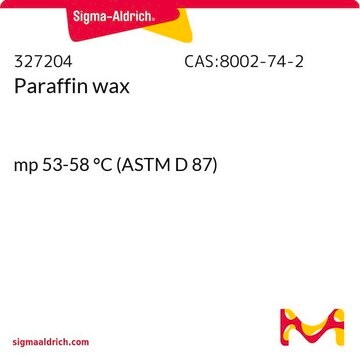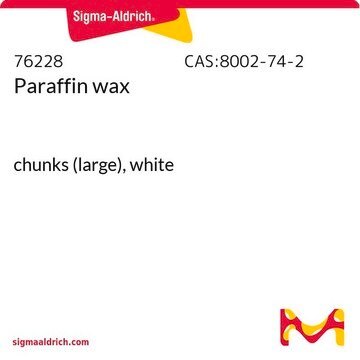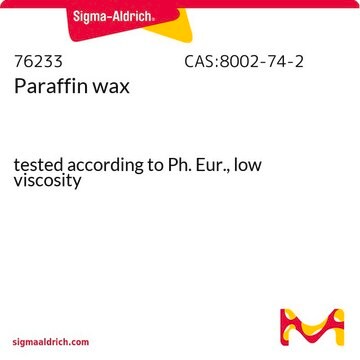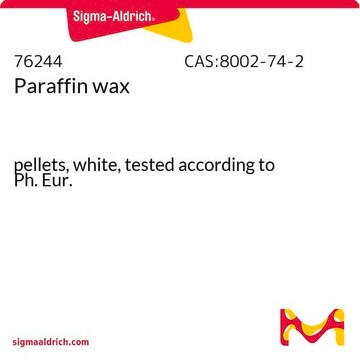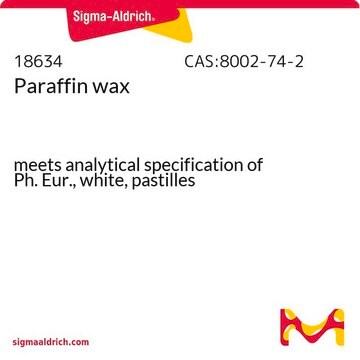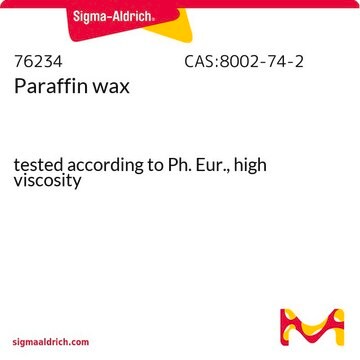Recommended Products
form
pellets
Quality Level
ign. residue
≤0.05%
color
white
mp
43-95 °C
transition temp
solidification point 54-56 °C
InChI key
JWHAUXFOSRPERK-UHFFFAOYSA-N
Looking for similar products? Visit Product Comparison Guide
Storage Class Code
13 - Non Combustible Solids
WGK
nwg
Flash Point(F)
602.6 °F - Pensky-Martens closed cup
Flash Point(C)
317 °C - Pensky-Martens closed cup
Personal Protective Equipment
dust mask type N95 (US), Eyeshields, Gloves
Choose from one of the most recent versions:
Already Own This Product?
Find documentation for the products that you have recently purchased in the Document Library.
Customers Also Viewed
Roman Zimmermann et al.
Plant physiology, 152(1), 356-365 (2009-11-21)
In an approach to study lateral root development in monocots, genome-wide searches for homologs of the Gibberellic Acid Stimulated Transcript-like (GAST-like) gene family in rice (Oryza sativa) and maize (Zea mays) were carried out. Six novel GAST-like genes in rice
Wisam Al-Faqheri et al.
PloS one, 8(3), e58523-e58523 (2013-03-19)
This paper introduces novel vacuum/compression valves (VCVs) utilizing paraffin wax. A VCV is implemented by sealing the venting channel/hole with wax plugs (for normally-closed valve), or to be sealed by wax (for normally-open valve), and is activated by localized heating
Synnöve Staff et al.
Journal of clinical pathology, 66(9), 807-810 (2013-06-12)
Formalin fixation preserves tissue morphology at the expense of macromolecule integrity. Freshly frozen samples are the golden standard for DNA and RNA analyses but require laborious deep-freezing and frozen sectioning for morphological studies. Alternative tissue stabilisation methods are therefore needed.
Abdulazeez Salawu et al.
PloS one, 7(11), e50415-e50415 (2012-12-05)
Most soft tissue sarcomas are characterized by genetic instability and frequent genomic copy number aberrations that are not subtype-specific. Oligonucleotide microarray-based Comparative Genomic Hybridisation (array CGH) is an important technique used to map genome-wide copy number aberrations, but the traditional
André Luis Costa-da-Silva et al.
PloS one, 8(1), e53816-e53816 (2013-01-24)
Aedes aegypti, the main vector of dengue virus, requires a blood meal to produce eggs. Although live animals are still the main blood source for laboratory colonies, many artificial feeders are available. These feeders are also the best method for
Our team of scientists has experience in all areas of research including Life Science, Material Science, Chemical Synthesis, Chromatography, Analytical and many others.
Contact Technical Service
